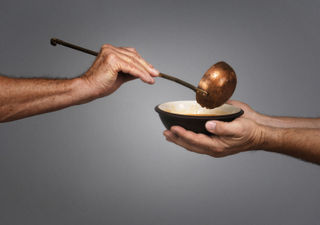

The United States has one of the highest rates of homelessness among industrialized countries. And its culture is one of the most individualistic. Is this a coincidence? “Rugged individualism” is often thought of as a positive characteristic that leads to creativity and achievement. The down side of individualism is an “every man for himself” mentality that does not provide a safety net for those who need one.
Germany, which is less individualistic than the United States, does provide a safety net for its citizens. Germans enjoy a guaranteed minimum income, generous unemployment benefits, and strong tenants’ rights. In a comparative study, the rate of homelessness in Germany was 2.4%, compared to 6.2% in the United States. Germans were also more compassionate than Americans toward the homeless. Which means that Germans felt more of a connection to homeless people than Americans did.
Each December during the holidays, my church shelters local homeless families. The families are fed, socialize with church members, and sleep in our church building. The first time my family helped with the shelter, my children were in elementary school. In preparing my children to meet the homeless families, I emphasized that they were just like us but had some misfortunes. Some of the families had parents who lost their jobs. Others had one or two parents working who were not making enough money to make ends meet. Others had medical expenses that caused them to lose their homes. When we arrived at our church to meet the homeless families, one of my children whispered to me, “Where are the homeless people?” I whispered back, “They are all around you. Remember they are just like us.” A new family was scheduled to join the shelter that evening. And the homeless families in the shelter assumed that my family was the new family.
Research indicates that contact with homeless people can humanize them. A large group of volunteers escorted homeless people to get health care, housing, and job information at an event on a college campus. This contact caused the volunteers to have more empathy for homeless people. One of the volunteers said that she realized the homeless are “just like me” - the same message my children learned at our church shelter.
Homeless people can’t go home for the holidays. So, during the holiday season:
- When you go shopping, take some granola bars to pass out to any homeless person you see
- Or volunteer at a soup kitchen
- Or contact a homeless shelter to see how you can help
This may not do much to make the United States less individualistic or create systemic changes to help homeless people. But it may humanize homeless people and help you realize that they are “just like us.” Which may be a first step toward the cultural changes that will make us more connected and compassionate.
References
Knecht, T., & Martinez, L. M. (2009). Humanizing the homeless: Does contact erode stereotypes? Social Science Research, 38, 521-534.
Matsumoto, D., Yoo, S. H., & Fontaine, J. (2008). Mapping expressive differences around the world the relationship between emotional display rules and individualism versus collectivism. Journal of Cross-Cultural Psychology, 39, 55-74.
Toro, P. A. et al. (2007). Homelessness in Europe and the United States: A comparison of prevalence and public opinion. Journal of Social Issues, 63, 505-524.

